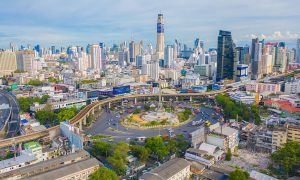With more and more people choosingImmigration to ThailandIn addition to adapting to a new living environment, tax obligations have also becomeimmigrantsAn important part of the process that cannot be ignored. Thailand's tax system may seem complicated to immigrants, but with understanding and planning, you can avoid tax issues and create a more stable foundation for your life in Thailand. This article will explain in detailImmigration to ThailandPost-tax obligations, including tax classifications, the tax implications of residency status, common taxes, and how to legally optimize your tax burden.
One,Thailand Tax Systemsummarize
The tax system in Thailand consists of the following main types of taxes:
- personal income tax(Personal Income Tax, PIT): A tax on personal income, including wages, investment income, and other sources of income.
- corporate income tax(Corporate Income Tax, CIT): A tax on corporate profits.
- value-added tax (VAT)(Value Added Tax, VAT): A tax on the sales of goods and services.
- non-residential property(Stamp Duty): levied on certain transactions, such as real estate transactions and rental agreements.
- property tax(Property Tax): A tax levied on the ownership of real estate.
II. Difference between tax residents and non-tax residents
In Thailand, tax status directly determines the type and rate of tax you are subject to. Under the Thai Tax Act, whether a person is a tax resident depends on how long they have lived in Thailand.
- Tax Resident::
If you reside in Thailand for more than 183 days in a tax year, you are considered a tax resident of Thailand. Tax residents are required to declare and pay tax on their worldwide income, but are usually only effectively taxed on Thai-sourced income. - Non-Tax Resident (NTR)::
Individuals who reside in Thailand for less than 183 days are recognized as non-tax residents and are only required to pay tax on Thai-sourced income.
draw attention to sth.: Even if one becomes a tax resident, there are certain exemptions to the taxation of global income, such as when the income is not remitted to Thailand.
III. Calculation of personal income tax
Thailand's personal income tax is progressive and applies to different ranges of annual income, with rates ranging from 0% to 35%. Below is the latest tax rate schedule for 2024:
| Income range (baht) | tax rate |
|---|---|
| 0 – 150,000 | 0% |
| 150,001 – 300,000 | 5% |
| 300,001 – 500,000 | 10% |
| 500,001 – 750,000 | 15% |
| 750,001 – 1,000,000 | 20% |
| 1,000,001 – 2,000,000 | 25% |
| 2,000,001 – 5,000,000 | 30% |
| Over 5,000,000 | 35% |
Deductions and Exemptions
- personal allowance: Income of 150,000 baht per year is exempt from tax.
- Family Deduction: Additional deductions are available for applicants with spouses and children.
- Other deductions:: Includes social insurance, pension plans, charitable donations, etc.
IV. Common tax scenarios after emigration
1. Income from work
If you are working in Thailand, your salary will be taxed directly by the Thai tax authorities. Employers usually withhold and pay the tax on your behalf, so you need to make sure that the tax deductions are clearly listed on your payslip.

2. Investment income
Thailand taxes investment income, such as dividends, interest and capital gains, as appropriate. Example:
- dividend income: The tax rate is 10%.
- Interest on bank deposits: Interest on deposits exceeding 20,000 Baht is subject to a withholding tax of 15%.
3. Overseas income
For tax residents, worldwide income is subject to declaration, but is actually taxed only when the income is remitted to Thailand. If the income is left overseas, it is usually exempt from tax.
4. Property tax
The purchase of property after emigration is subject to property tax and transfer tax. Income from renting out the property is included in the personal income tax.
V. How to file tax returns
- registered tax ID
After immigrating, you need to register your Taxpayer Identification Number (TIN) with the local tax office. - Submission of tax returns
- The annual tax filing deadline is March 31 and applies to the previous year's income.
- You can file online or submit offline through the official website of the Inland Revenue Authority of Thailand.
- Engagement of professional tax advisors
If your income structure is complex or involves overseas income, it is advisable to engage a professional tax advisor to ensure compliance.
VI. Suggestions for legal tax optimization
- Utilizing Thailand's tax treaties
Thailand has signed Double Taxation Agreements (DTAs) with a number of countries. Knowing the contents of the tax agreements between Thailand and the country of origin before emigrating can reduce the risk of double taxation. - Rational planning for overseas income
If you plan to remit your overseas income to Thailand, it is recommended that you consult a tax expert before emigrating to design a reasonable capital flow plan. - Tax relief and exemptions
Take advantage of the various tax breaks offered by the Thai government, such as pension plans or purchasing health insurance.
VII. Tax risk and compliance
The Revenue Authority of Thailand (RAT) has high tax compliance requirements, especially in recent years when international tax regulations have been strengthened through tax information exchange agreements (e.g. CRS agreements) with other countries. Tax violations may result in fines or more serious legal consequences. Therefore.Immigration to ThailandAfterward, it is important to ensure that tax returns are accurate and timely.

concluding remarks
Tax planning is an important part of immigrating to Thailand. Understanding Thailand's tax policies, classification and related obligations before emigrating can help you better adapt to your new life and avoid unnecessary tax disputes. Whether you are planning your personal income, investment returns, or dealing with overseas assets, it is advisable to consult a professional in advance.Immigration to ThailandNot only is it a lifestyle change, it is also a re-planning of your personal finances. With adequate preparation and compliance, you will be able to easily cope with your tax obligations after immigration and enjoy your time in Thailand.






